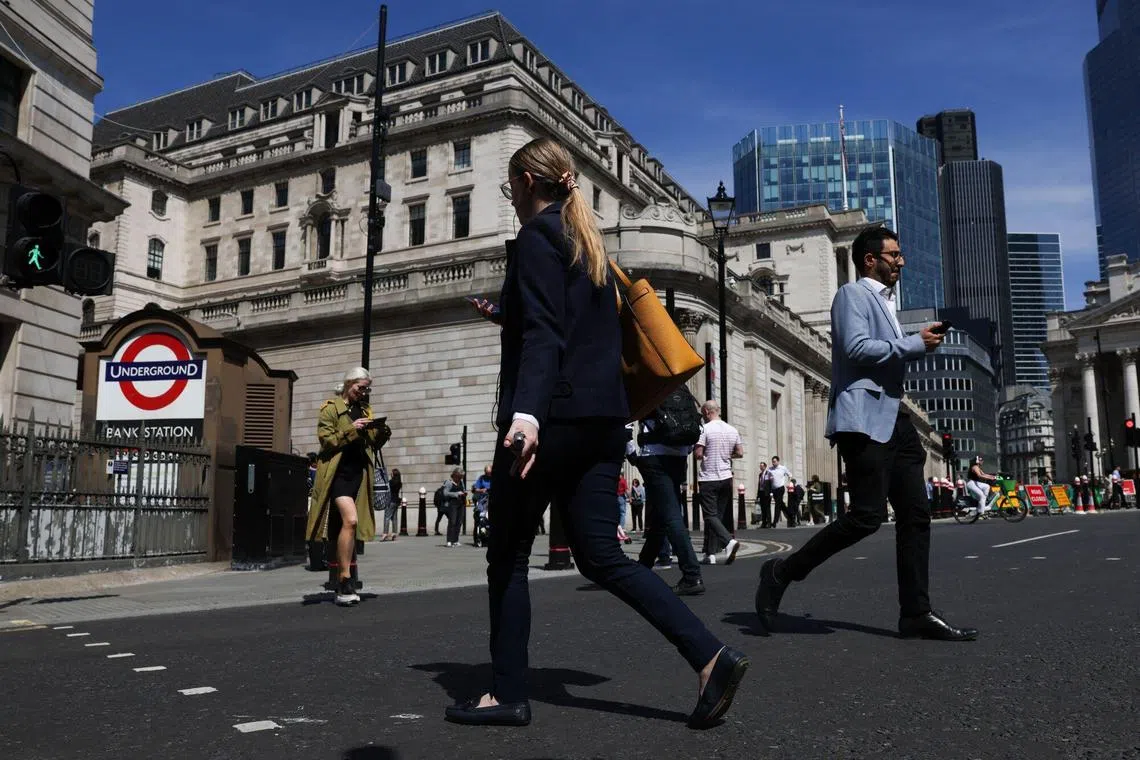Britain exits recession with fastest growth in nearly 3 years
Sign up now: Get ST's newsletters delivered to your inbox

The Bank of England held interest rates at a 16-year high despite signs of easing inflation.
PHOTO: BLOOMBERG
LONDON – Britain’s economy grew by the most in nearly three years in the first quarter of 2024, ending the shallow recession it entered in the second half of 2023 and delivering a boost to Prime Minister Rishi Sunak ahead of an election.
The Office for National Statistics (ONS) said gross domestic product (GDP) expanded by 0.6 per cent in the three months to March, the strongest growth since the fourth quarter of 2021 when it rose by 1.5 per cent.
The first-quarter growth exceeded all forecasts in a Reuters poll of 39 economists, which pointed to a 0.4 per cent expansion of gross domestic product in the January-to-March period, after GDP shrank by 0.3 per cent in the final quarter of 2023.
The data on May 10 was welcomed by Mr Sunak, who said the economy has “turned a corner”, although the opposition Labour Party, which has a large lead in opinion polls, accused Mr Sunak and Finance Minister Jeremy Hunt of being out of touch.
“There is no doubt it has been a difficult few years, but today’s growth figures are proof that the economy is returning to full health for the first time since the pandemic,” Mr Hunt said.
But the opposition Labour Party rejected those claims.
“This is no time for Conservative ministers to be doing a victory lap and telling the British people that they have never had it so good,” said Labour’s Ms Rachel Reeves, who hopes to succeed Mr Hunt as finance minister.
The Bank of England, which held interest rates at a 16-year high on May 9
Turning a corner?
On a monthly basis, the economy grew by 0.4 per cent in March, faster than the 0.1 per cent growth forecast by economists in a Reuters poll, reflecting strength in retail, public transport, haulage and health - partly due to fewer public-sector strikes.
Car manufacturing also performed well, offset by continued weakness in construction, the ONS said.
The latest data also showed that GDP in March was 0.7 per cent higher than a year earlier, and above all economists’ expectations of a 0.3 per cent rise.
However, Britain has still has one of the slowest recoveries from the effects of the coronavirus pandemic.
At the end of the first quarter of 2024, the country’s economy was just 1.7 per cent bigger than its level in late 2019, before the pandemic, with only Germany among the Group of Seven faring worse.
“Despite the better near-term outlook, the improvement in GDP growth looks likely to be constrained by the ongoing weakness in productivity growth, as well as reduced scope to increase employment levels,” Ms Yael Selfin, chief economist at KPMG UK, said.
GDP per head rose for the first time in two years in the first quarter, up 0.4 per cent, but was 0.7 per cent lower than a year earlier, highlighting the ongoing squeeze on living standards and Britain’s struggle to boost productivity.
“In per capita terms, it could be said that UK households have seen little meaningful improvement in living standards in the last two years,” Mr Gora Suri, an economist at PwC, said. REUTERS


